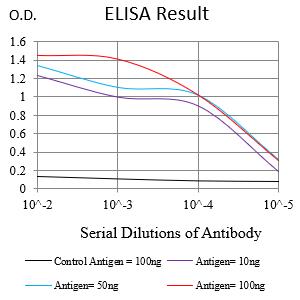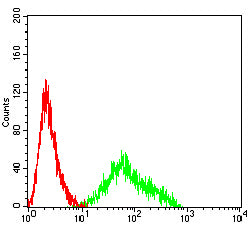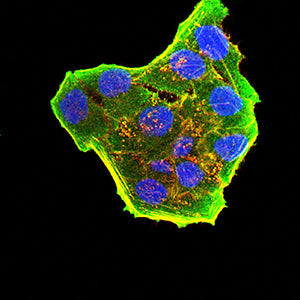


| WB | 咨询技术 | Human,Mouse,Rat |
| IF | 咨询技术 | Human,Mouse,Rat |
| IHC | 咨询技术 | Human,Mouse,Rat |
| ICC | 1/50 - 1/200 | Human,Mouse,Rat |
| FCM | 1/200 - 1/400 | Human,Mouse,Rat |
| Elisa | 1/10000 | Human,Mouse,Rat |
| Aliases | PBT; SCFR; C-Kit; CD117; MASTC |
| Entrez GeneID | 3815 |
| clone | 1H1B1 |
| WB Predicted band size | 110kDa |
| Host/Isotype | Mouse IgG2b |
| Antibody Type | Primary antibody |
| Storage | Store at 4°C short term. Aliquot and store at -20°C long term. Avoid freeze/thaw cycles. |
| Species Reactivity | Human |
| Immunogen | Purified recombinant fragment of human KIT (AA: 23-322) expressed in E. Coli. |
| Formulation | Purified antibody in PBS with 0.05% sodium azide |
+ +
以下是关于KIT抗体的3篇代表性文献及其摘要概括:
---
1. **文献名称**:*Gain-of-function mutations of c-kit in human gastrointestinal stromal tumors*
**作者**:Hirota S. et al.
**摘要**:该研究首次揭示了KIT基因功能获得性突变在胃肠道间质瘤(GIST)中的关键作用,并通过免疫组化(使用KIT抗体)证实了突变导致KIT蛋白持续激活,为GIST的诊断和治疗提供了分子标志物。
---
2. **文献名称**:*Kinase mutations and imatinib response in patients with metastatic gastrointestinal stromal tumor*
**作者**:Heinrich M.C. et al.
**摘要**:文章探讨了KIT不同突变亚型对伊马替尼(KIT抑制剂)治疗反应的差异,利用KIT抗体检测肿瘤组织中的蛋白表达水平,发现特定突变与药物敏感性相关,指导了临床个体化治疗。
---
3. **文献名称**:*KIT and PDGFRA mutations in gastrointestinal stromal tumors: Molecular markers for diagnostic stratification*
**作者**:Antonescu C.R. et al.
**摘要**:研究通过KIT抗体免疫组化分析,结合基因测序,比较了GIST中KIT与PDGFRA突变亚型的分子特征,提出抗体检测联合分子分型可优化诊断及预后评估。
---
4. **文献名称**:*The biology of stem cell factor and its receptor c-Kit*
**作者**:Ashman L.K.
**摘要**:这篇综述系统总结了KIT受体在造血干细胞、肥大细胞中的生理功能,并讨论了KIT抗体在基础研究(如细胞信号研究)和临床靶向治疗中的双重应用价值。
---
以上文献涵盖了KIT抗体在疾病机制、诊断分型、治疗预测及基础研究中的关键作用,均为该领域的经典或高影响力研究。
KIT antibodies target the KIT protein, a transmembrane tyrosine kinase receptor encoded by the *KIT* proto-oncogene. Also known as CD117. KIT plays a critical role in cell signaling pathways regulating proliferation, differentiation, and survival. It is activated by binding to its ligand, stem cell factor (SCF), leading to receptor dimerization and autophosphorylation, which triggers downstream signaling cascades like the MAPK and PI3K-AKT pathways. KIT is essential for the development and function of hematopoietic stem cells, mast cells, melanocytes, and interstitial cells of Cajal.
Dysregulation of KIT, often due to gain-of-function mutations, is implicated in various malignancies. These include gastrointestinal stromal tumors (GISTs), acute myeloid leukemia (AML), mastocytosis, and melanoma. In GISTs, approximately 85% of cases harbor *KIT* mutations, making it a key diagnostic marker and therapeutic target. KIT antibodies are widely used in research and clinical diagnostics to detect KIT expression via immunohistochemistry (IHC), flow cytometry, or Western blot, aiding in tumor classification and treatment planning.
Therapeutically, monoclonal antibodies and tyrosine kinase inhibitors (TKIs) targeting KIT, such as imatinib, have revolutionized treatment for KIT-driven cancers. However, resistance mutations remain a challenge, driving ongoing research into next-generation inhibitors. KIT antibodies also contribute to understanding normal and pathological cellular processes, including stem cell biology and immune responses. Their dual role in diagnostics and molecular research underscores their significance in precision oncology and translational medicine.
×